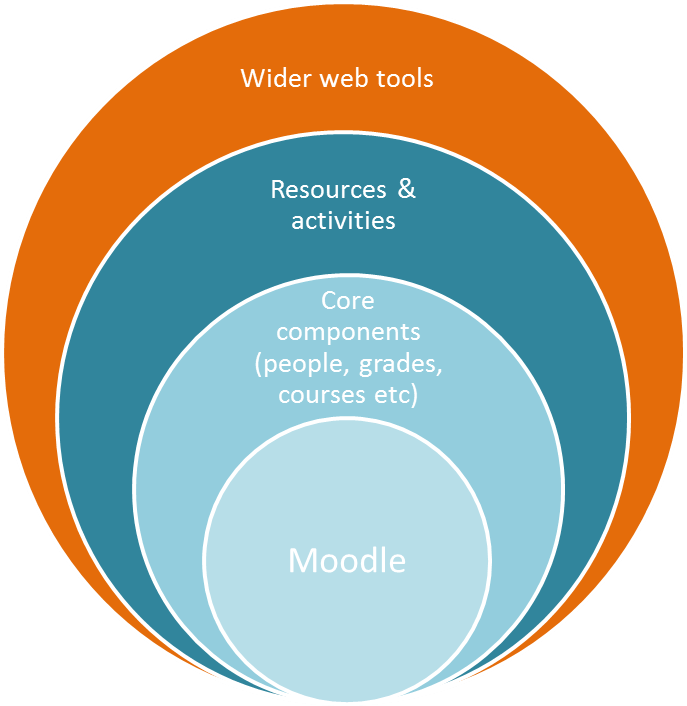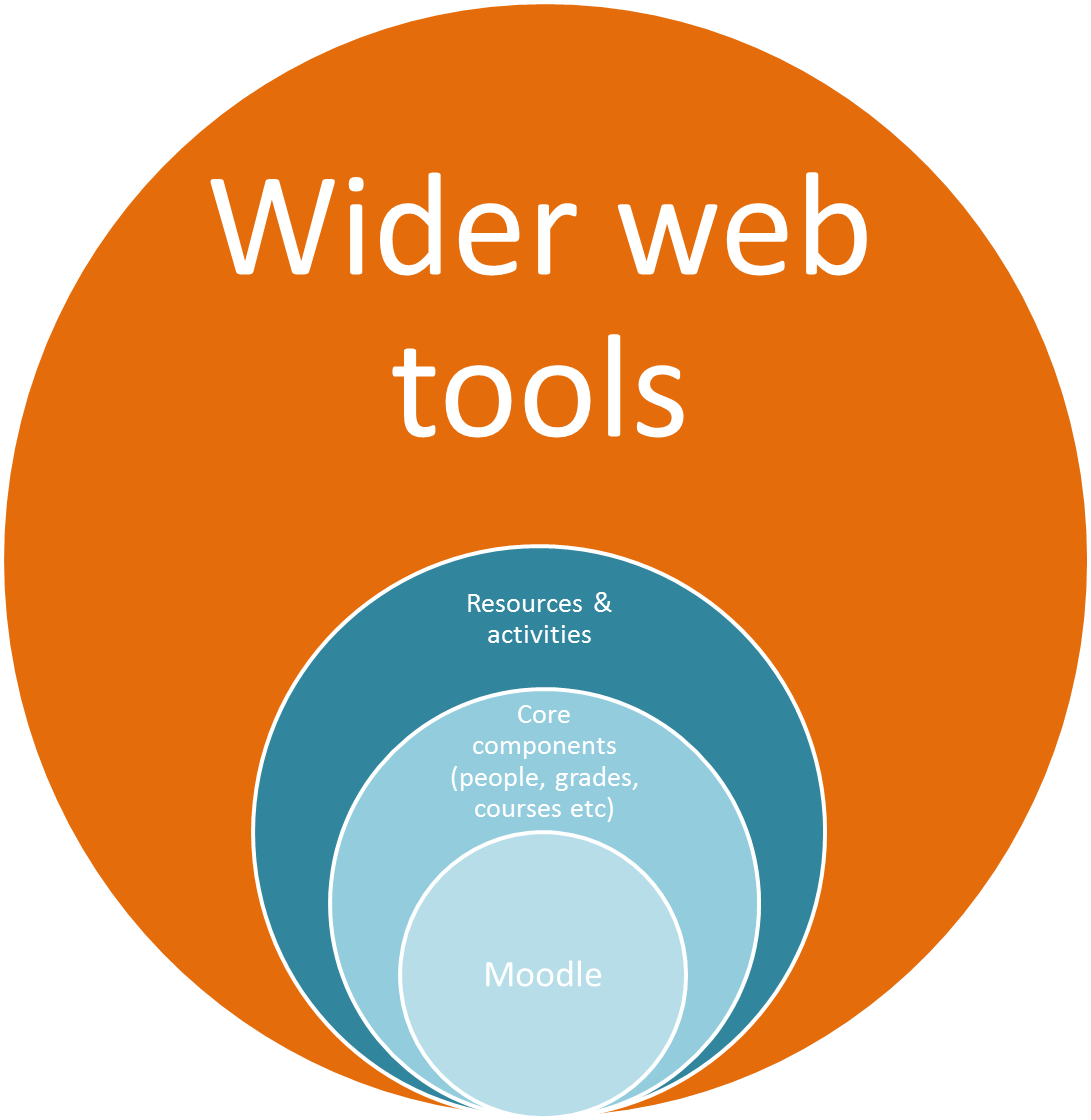The future of Moodle is well within our grasp
By Matt Jenner, on 17 September 2012
Moodle is open source software and is used by millions of people around the world. Open source allows anyone to tinker with the code; adding new things, changing existing & ultimately deciding which direction their Moodle heads in. Many of these changes are shared within the Moodle community for others to freely use – this leads to the core software being developed, extended and reformed in many directions. Keeping a steer on this is Moodle HQ, a group of 20 ‘core’ developers and, tightly connected, many global developers, testers, documentation writers, really helpfulers (people who help the community on Moodle.org with problems) and many others. What’s sometimes lacking with Moodle is the input, or link to education research including academics, learners, administrators, developers, testers, researchers and everyone else.
1st Moodle Research Conference
Blogging from Crete – Greece, this post attempts to summarise two days of the 1st Moodle Research Conference. The conference was the first iteration of an event unlike other established Moodle, or educational meet-ups. Sold as “a unique event dedicated to the research and development (R&D) on learning and teaching carried out with Moodle”. What that actually meant evolved right though the two days as the conference delegates shared, talked and discovered the direction Moodle is heading in.
The international conference had around 70 delegates from 22 countries. There were 23 presentations showcasing developments, case studies, new tools, learning designs, learning analytics and addressing challenging issues and introducing new ideas; all for Moodle. Additionally there were seven posters, three meals, one panel discussion and one keynote – from Martin Dougiamas, the man who invented Moodle. If that wasn’t enough, we were also in the Creta Maris – a somewhat splendid and slightly distracting conference venue with the Mediterranean Sea lapping at our feet, the sun beating down and wild cats meowing for scraps of lunch.
The aim of the conference, at least from my perspective, was to see how educational research was influencing Moodle development. After all, we have this tool which is designed around teaching and learning but it also continual evolves. To ensure it changes along with established understanding of how people learn and what affordances technologies can offer, we must ensure a cyclic loop exists, with each feeding in the other. Or, at least that’s the idea.
User-centred design
Often is the case that developers say they wish to just get on with developing and that theorists are too theoretical (with their heads in the clouds). The crux of the issue seems to be that established and ratified theory must influence design, design must influence development and developers must do the same.
One argument against Moodle is that it’s not intuitive, this may be most strongly felt by academics as they mutter that Moodle doesn’t quite map onto teaching, takes too much time and isn’t always an environment which encourages alternative approaches to learning and teaching. Instead, and this is something I’m happy to agree with, Moodle is technology, this is akin to something ‘that doesn’t work yet’. If Moodle ‘worked’ we wouldn’t need so many people helping with it, it’d just ‘work’. To keep things simple, I don’t remember the last time I explained how a chair works, which was once a technology itself.
Moodle is over 10 years old now, and along the way many innovative additions have come to the software. But, also over the years sometimes developments have not always been linked to the research and, unfortunately the emergent disconnect between designers, practitioners, theorists and everyone in the middle appears. This has resulted in both innovation and disruption. Moodle development is the output of highly skilled and passionate people all contributing towards something they want to improve. What’s being addressed here is slightly more complex, with so many developments it’s often hard to see where the edges are. Further, developments are not necessarily tied together, and we end up being back outside the cyclic process shown above.
While there is plenty of time to disseminate the talks in the conference, I felt this blog post was better positioned to give a higher level view into what’s happening with Moodle. The simple fact is the web is evolving very quickly, start-ups can build, destroy and rebuild with minimal fear of reprise. This could be because they promote agility in their staff and in their product, or because they are nowhere near as established as something like Moodle where agility can have a negative impact for a large community of users.
What is Moodle now
Essentially a lot of Moodle is internally facing, tools are developed to be a part of the ecosystem of Moodle.
What will Moodle become?
This is harder to describe, but the value of tools external to Moodle are immensely useful. Linking intelligently to these is important, and focusing on strengthening the internal tools make sense, rather than necessarily diversifying them by adding many more. This is just one view, the route is still to be defined. The important thing is to consider Moodle as the base, the developments focus around educational developments and the wider tools linked in, rather than reinvented.
The next direction?
What’s most important is that the developments are fed back from users; that’s all types identified. The next few years are going to be important for Moodle, for UCL and the wider community. At some point will come the dreaded system review, comparison and evaluation. It will have to stand up against the changing landscape of tools and environments for online learning and teaching. By concentrating its developments around the best understanding of relevant pedagogical research, it’ll hopefully retain Moodle’s strength, improve the system for everyone and keep Moodle aligned as one of the world’s best learning management systems.
Well, that’s the current plan.
References
SAP (2012). Principles of UI Development, SAP Community Network. Last accessed 17th September 2012 from http://wiki.sdn.sap.com/wiki/display/BBA/Principles+of+UI+Development
8 Responses to “The future of Moodle is well within our grasp”
- 1
-
2
Carol Shergold wrote on 18 September 2012:
Hi Matt
Thanks for the interesting write up on the 1st Moodle Research Conference.
At Sussex we really agree about the importance of user centred design – and the user experience – for learning systems. In fact the team have just presented on this at ALT-C 2012 (see http://blogs.sussex.ac.uk/elearningteam/2012/09/12/better-user-experience-better-learning-experience/).
Were there specific conference presentations focussed on user centred design, or was it something that came up more during the discussions?
Thanks for any additional info
Carol
-
4
Matt Whyndham wrote on 1 October 2012:
I read the second image as “more functionality will come from generic tools, and less from Moodle code”.
It wasn’t clear whether that was absolutely more (functions are outsourced to generic web stuff), or relatively more (there’s more stuff out there, so Moodle represents less of the experience).
In either case, obsolescence starts to worry me a bit. In other words, the relatively rapid development cycle of external tools could mean that they come and go more rapidly than Moodle developers, or indeed users, can cope with.
A great tool that works in 2012 might not be available to link to at all in 2015. Therefore it might be better not to use it at all, or to create an in-house, that is, in-Moodle equivalent.
-
6
xenoswarren wrote on 4 October 2012:
Nice post! that is good information about Moodle 2.X, it is useful to me thanks.
-
7
Moodle Research Conference « Tabitha's Blog wrote on 8 November 2012:
[…] http://blogs.ucl.ac.uk/digital-education/2012/09/17/the-future-of-moodle-is-well-within-our-grasp/ Share this:Like this:LikeBe the first to like this. Comments (0) Trackbacks (0) Leave a comment Trackback […]
-
8
Moodle Research Conference » wrote on 8 November 2012:
[…] http://blogs.ucl.ac.uk/digital-education/2012/09/17/the-future-of-moodle-is-well-within-our-grasp/ […]
 Close
Close





Great posting. We need to think in software about 3 speeds of development
Fast
Medium
Slow
Fast is Moodle 2.X. This is a pipeline of error correction and marginal improvement, but also being able to add something very quickly – the agile dimension
Medium is Moodle 3.X This is still recognisably Moodle, but is not based only on minor increments. Moodle 2 was a medium style enhancement from Moodle 1, but it is now recognised that this needed a different type of “sales” effort from Fast Development. Sales and marketing are just as important in open source, it is just they are not simply about money, but about take-up and committment.
Slow is Moodle 2020. This will owe nothing at all to 2.X and 3.X. It will be revolutionary, in my opinion based on the semantic web and proactive learning. It will be disliked by many Moodle users and developers, but represents the long-term future of the Moodle community.
The key issue for any open source community is I feel to separate out the capability centres developing these three parallel streams, rather than to treat all development activities as just fast or sometimes medium.